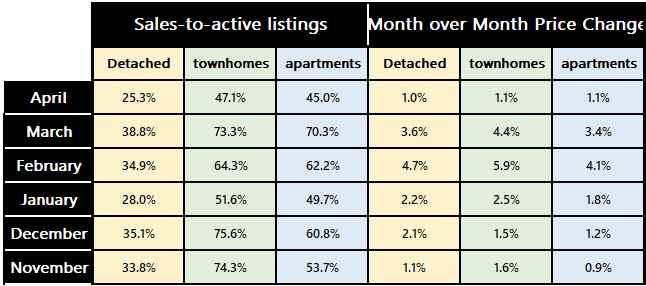This April the sales number has slowed down but it is still good. It is 1.5% above the 10-year April sales average. The inventory has dropped by 14.1% compared to 2021 but has increased 15.3% when compared to March. This is reflected in the significantly lower sales-to-active listings ratios and the lower month-over-month benchmark price increases. Extended periods where the ratio is above 20% will have upward pricing pressure. The sales-to-active listings for April for the detached homes, townhomes and apartments are respectively, 25.3%, 47.1% and 45.0%. The lower ratios correlate with the smaller price increase which has dropped to about 1%. There will be headwinds for the real estate market this year as rate increases are happening faster than expected. The Bank of Canada and the Federal Reserve were slow to act on the economic data and now they need to quicken the pace of rate increases.
Toronto’s market has already had two months of declining prices. The Federal Budget announced in April has included a 2-year ban on foreign buyers, sales taxes on assignment sales and full taxation on profits from flipping. These are all measures to slow the real estate market. Also the Bank of Canada and the Federal Reserve will continue to raise rates this year because of rising inflation. The TSX dropped almost 500 points today, while the DOW lost over 1000 points. Year-to-date the TSX has lost 2.48% while the S&P 500 has dropped 13% and the Nasdaq is down 17.13%. Typically, you would think the central banks will start coming in about now to stem the losses but they will not this time because inflation is much scarier than a recession. They will risk a recession over runaway inflation. Hopefully they will execute a perfect soft landing but because of the complexities many are doubtful this will happen. What drama!


